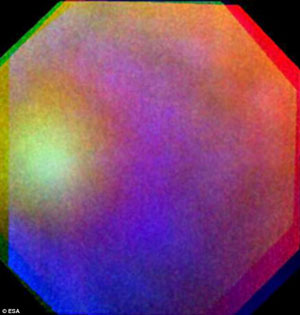The First Rainbow Seen on Another Planet2014 03 14By Red Ice Creations In a colourful first, astronomers have captured the image of a rare type of rainbow, or ’glory’, on another planet. Rainbows appear on Earth due to light refracting off water droplets. In the case of this rainbow on Venus, light is refracting off a previously observed haze that is thought to be sulfuric acid! Wojciech Markiewicz of the Max Planck Institute for Solar System Research in Gottingen, Germanytold New Scientist, "A full glory has never been seen before outside of the terrestrial environment." From NewScientist.com:  Scientists think glories occur when sunlight bounces about inside the droplets and ends up leaving in the same direction it came from, making a ring of light that can only be seen if you’re precisely between the sun and the centre of the glory. The particles must also be nearly spherical and almost all the same size. Read more at: newscientist.com |
New Live Show Number: 641-715-3636 pin 883267#
New Live Show Number: 641-715-3836 pin 883267#
↑Monday's thru Thur's,Join Us Live↑
Diamonds Show Monday - Thurs 8:30 pm EST, Surprise! segment, Cynthia with Astrology, Candy shop news, Special Guests, Building Relations with OUR Star Families with Chris, Learning "Who YOU Really are"
Recorded Line Via Phone 641-715-3813 pin 883267# Press # for the most recent call, or enter a previous reference # (Call by Skype phone via Skype credits or Skype phone using same number & pin above.)
Tuesday, April 8, 2014
Subscribe to:
Post Comments (Atom)

No comments:
Post a Comment